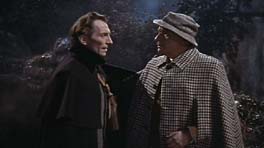The Hound of the Baskervilles
Sherlock Holmes ranks alongside Dracula and Frankenstein among the most filmed characters of all time. So it's only fitting that Britain's Hammer Films, after announcing itself to the world with international hits based on the well-known vampire and freakish monster, would turn its attention to Arthur Conan Doyle's detective. And, also fittingly, they tapped their two most popular players, Peter Cushing and Christopher Lee, to interpret the lead roles. The result deserves a high position on any list of the finest Holmes adaptations, and the best movies from the entire Hammer period, a fruitful era in horror and suspense films.
Basil Rathbone starred in fourteen films as the great detective and became an icon in the role. Additionally, there have been television series, children's cartoons and all manner of other media based on the character, whose name has become synonymous with complex problem-solving.
I'm constantly surprised that no modern producer has thought to revitalize the Holmes brand. There are dozens of mystery books featuring Holmes, Watson and their nemesis Moriarty out there waiting to be adapted for the screen, and any number of contemporary British actors could do wonders in the roles. (Picture, just as an example, Jeremy Irons as Holmes and Bob Hoskins as Watson. Or Alan Rickman as Holmes and Robbie Coltrane as Watson. I could keep going on like this, but you get the idea.)
This was the only film featuring Cushing in the role of Holmes, and he pulls it off swimmingly. He gets at Holmes' prickly, unlikable side without ever making the character obnoxious or irritating. At one point, after making a surprising escape from a collapsed mine shaft, Holmes essentially mocks his friends and associates as inferiors. Considering that Andre Morell portrays Watson with a quiet dignity not generally allowed the portly sidekick, the Holmes character seems all the more uncouth and pompous. He may have fantastical deductive skills, but his social graces leave much to be desired.
This sort of half-mad genius was a specialty of Cushing. His style of performance lends an air of gothic horror to the proceedings (which Hammer certainly played on in the marketing, selling the movie as straight-up horror). The story opens in London, where a doctor relates a strange legend to Holmes and Watson, about a curse on the Baskerville Family. Because of the actions of his ancestor Hugo Baskerville, wealthy aristocrat Sir Charles Baskerville has been attacked and killed by a vicious hound near his estate. Now, the only heir to the Baskerville fortune, Sir Henry Baskerville (Christopher Lee) must return to his ancestral home. But will there be a curse waiting for him when he arrives?
There have been several filmed adaptations of Doyle's novel "Hound of the Baskervilles." Peter Cook and Dudley Moore even collaborated on an ill-fated comic adaptation in the late seventies. I like the Hammer version best, and not just because of how fully Cushing inhabits the role of Holmes. I also enjoy director Terence Fisher's gorgeous, fogged-in cinematography, the remarkable set design and mise-en-scene (some of it provided by Peter Cushing from his private collection) and the film's eerie, generally unsettled atmosphere.
Hammer Films didn't exactly have the immense budgets to pull of grand-scale horror filmmaking, so not all of the effects sequences come off perfectly. The Hell Hound at the end, in particular, leaves something to be desired. But the film looks so terrific otherwise, and is told with such assured, steady, tight precision, any complaints begin to feel like quibbling. At 86 lean minutes, Hound of the Baskervilles is ideal suspense entertainment, a near-perfect little movie that was great fun to revisit.

No comments:
Post a Comment